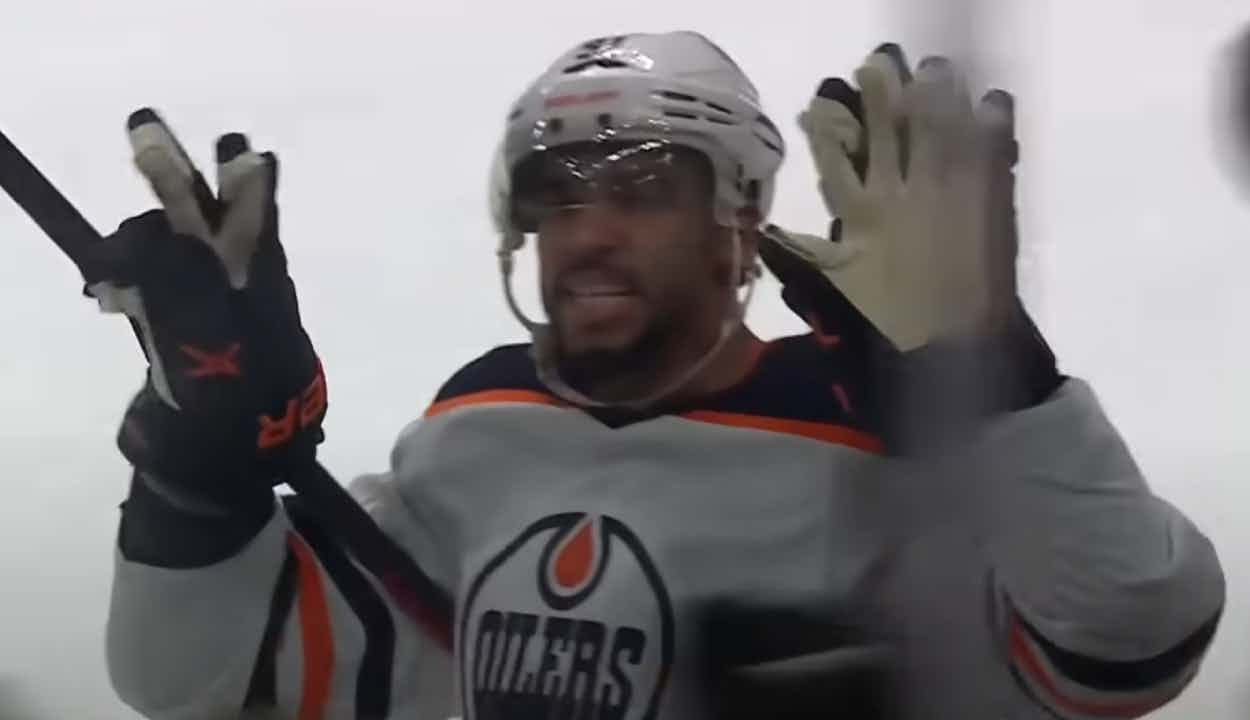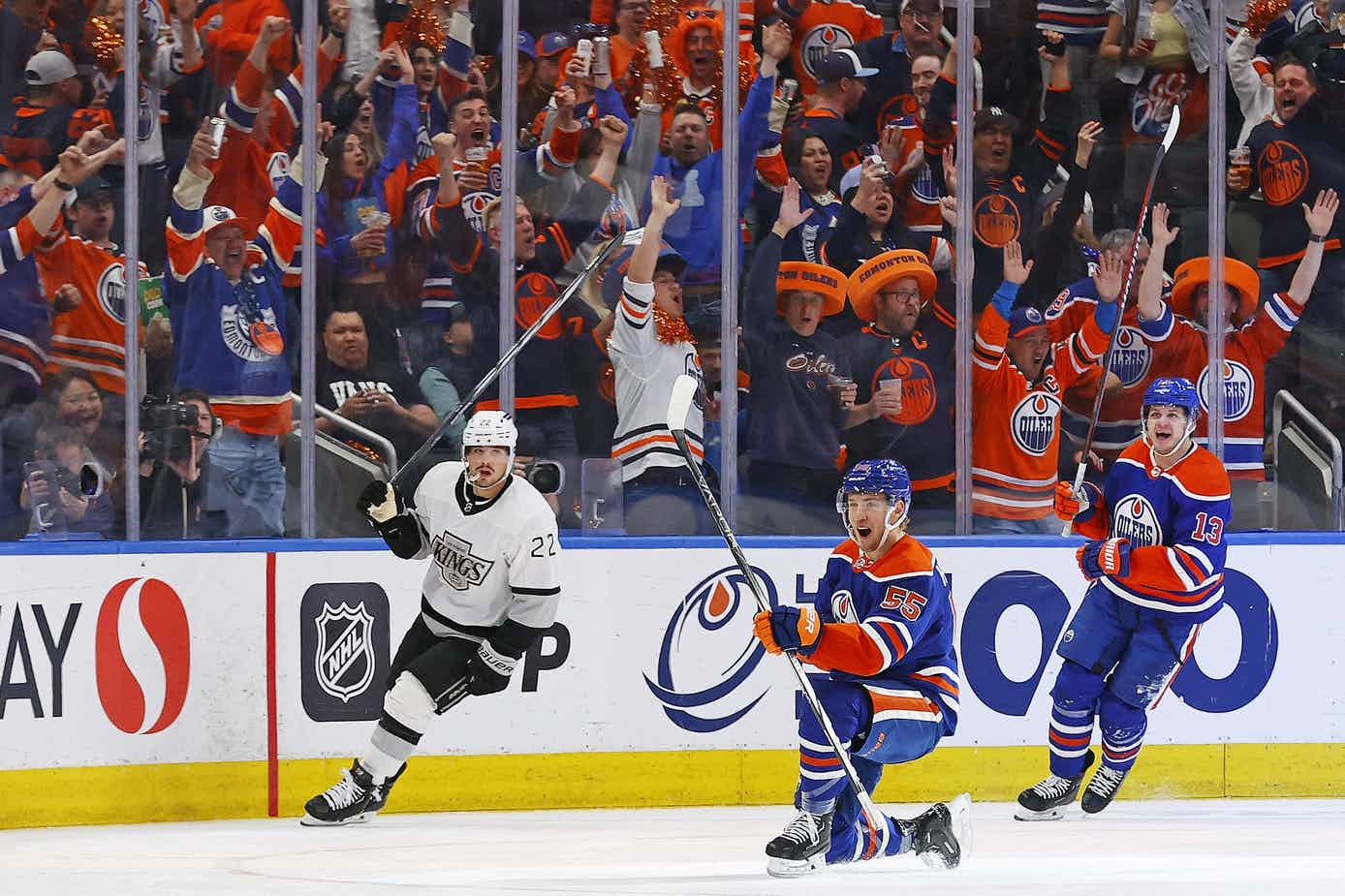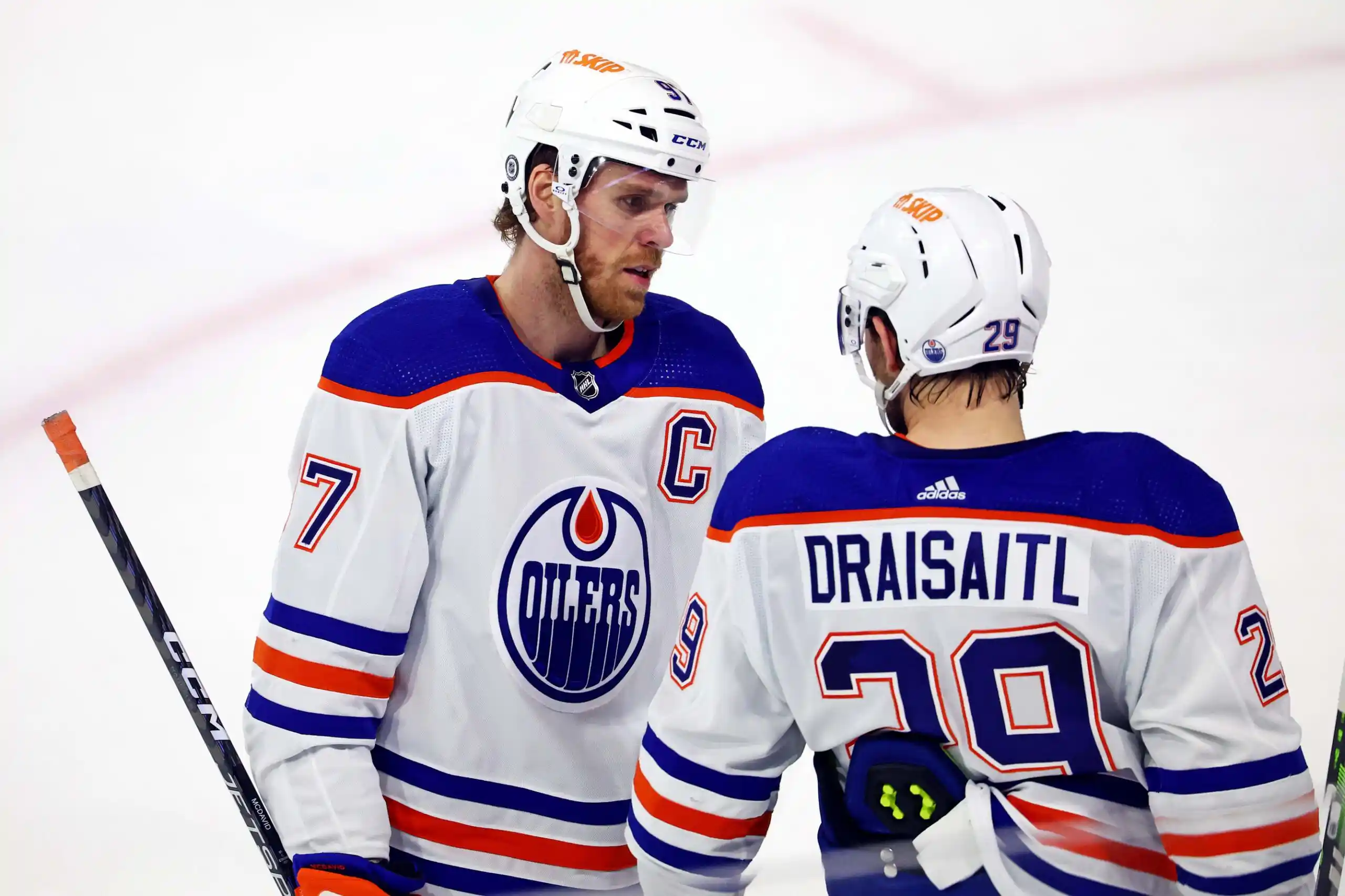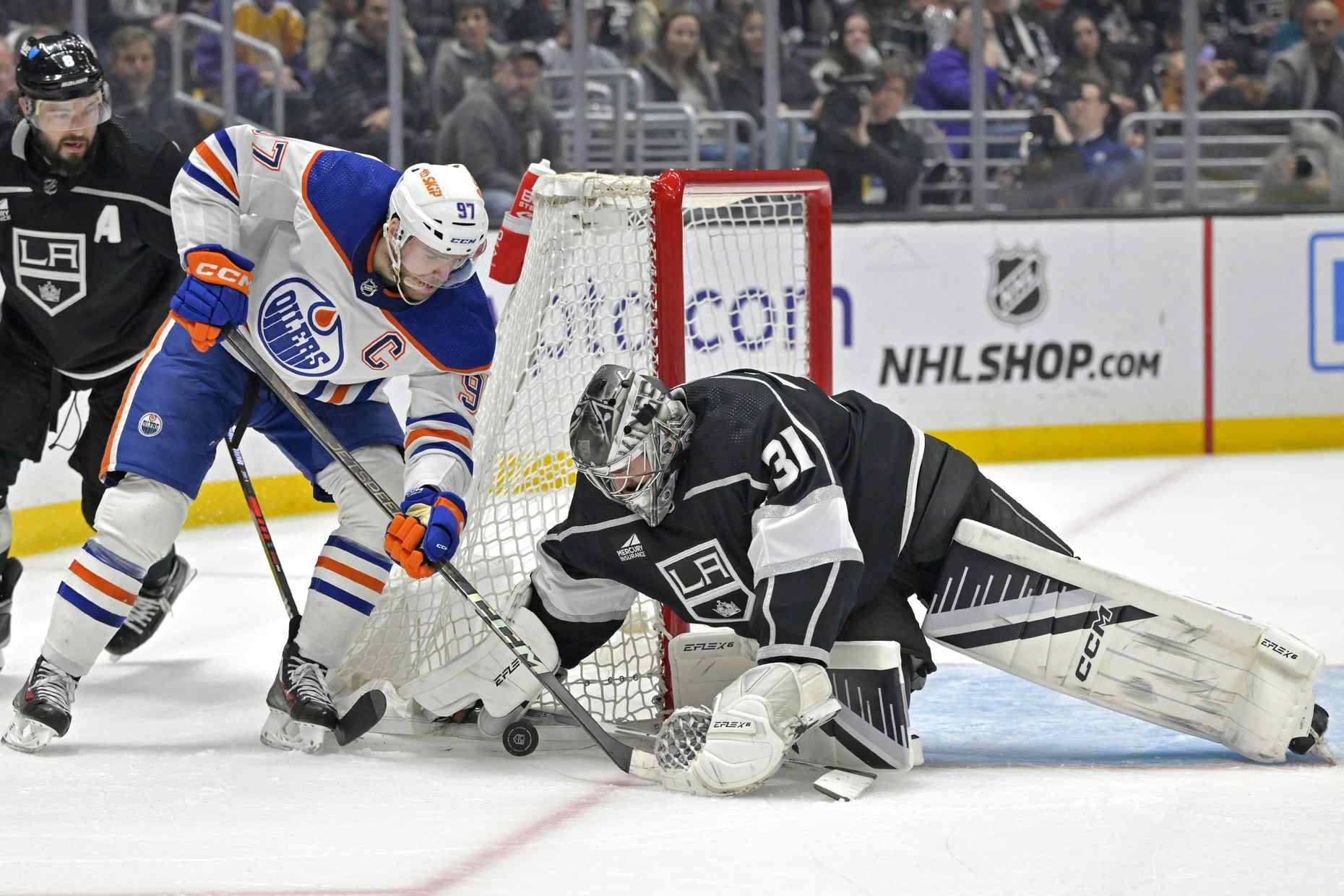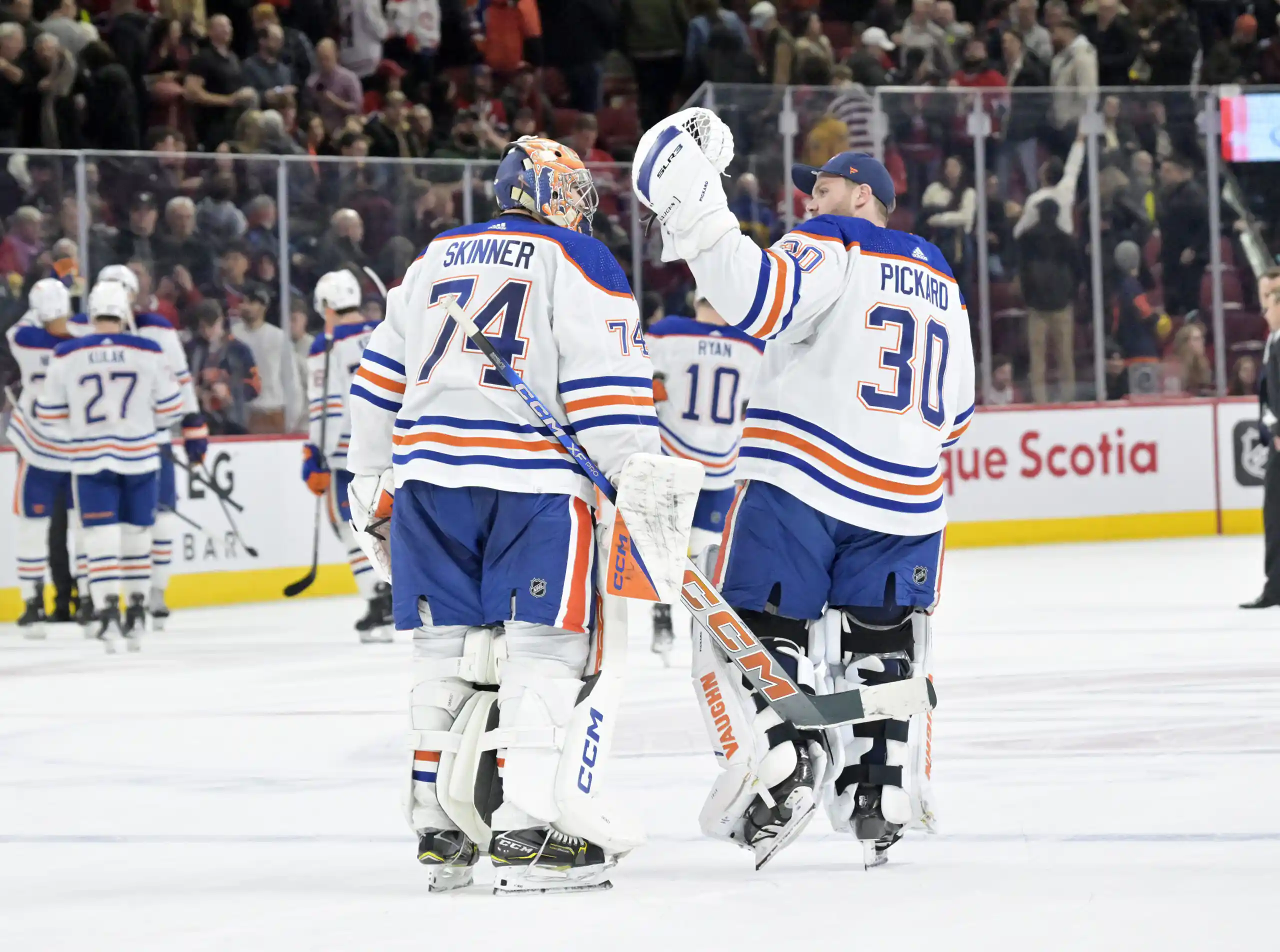DOUG WEIGHT LOOKS BACK AT HIS CAREER
By Jason Gregor
12 years ago
Doug Weight officially retired from the NHL last Thursday, and he joined Ryan Rishaug and I on my show last week to talk look back on his career, his new gig with the Islanders and why Edmonton meant so much to him.
JG: There have always been a few tales about the day you got dealt from the Rangers to the Oilers. How did it go down exactly? Is it true that you weren’t able to tell your wife you were traded until she saw you in an Oiler uniform on the ice, and did you actually think Shjon Podein was European because of the way his name was spelled?
DW: Well I got the wakeup call from my coach, I had to change rooms, they threw everything in a shopping cart and I passed Esa in the hallway and he said something to me, and I don’t think even Finns understand Esa Tikkanen, he said something, I went in and Allison found out on the concourse on the way in so she saw me – and a that time she was my girlfriend, now my wife.
I went out in warm up, and I was a little late for warm up getting out there and I saw her by the glass crying and I’m like ‘Oh my gosh, what is going on’. But, an incredible day and it was the best thing that happened to me going to Edmonton and experiencing my best years and.I’ve said it a couple times today, I knew within six months why they won five Stanley cups. The accountability and the responsibility they have throughout that organization – giving to the players and giving to the people that work there, and their focus and comradery. I was just an awesome place to have a big bolt in my career. It was great.
JG: Was the Shjon Podein story a myth or was that true?
DW: No – it was true. Who spells their name Shjon. He didn’t say much in the first period and I was like, this guy, I wonder where he’s from, I’ve never heard of him and I reached. I think it was either Shane Corson or Kelly Buchburger that I asked if he was Swedish, and Pods overheard me. Pods ended up being one of my better friends and we lived together for a bit and its funny when we tell the story, and he said “Hey – I’m from Minnesota,” so it was good.
RR: At the press conference you almost cracked, especially when you talked about Edmonton. Did it go as planned for you?
DW: I’ve felt really good about this decision for a long time. The last month I thought I was going to be able to motor through this, but I didn’t got the word retirement out and I had to stop and take a sip of water and I thought ‘This isn’t going to be good.’
It’s funny, I had written down about eight or nine pages and took about 12 minutes and I wanted to re-cap some things with each chapter of my career, but I got to Edmonton and I needed about 20 seconds because all those memories come flooding back. Edmonton was a very special place for me in my heart and it always will be. Great people I’ve met on the ice and in the organization, great times, great place to play, so many people touched me there and taught me so much there, and I just really owe the city and the team and the organization a lot.
JG: After 1033 points in his NHL career, your best individual seasons definitely came with the Edmonton Oilers. I remember in 2001 when you talked about the trade in St. Louis and it really came down to money. You would have been leaving a lot of money on the table and Edmonton at that point wasn’t in a situation to match it. How difficult was that for you looking back here ten years later and did it ever frustrate you that you were never able to put up the same type of numbers in St. Louis that you did in Edmonton?
DW: Yah – I think on the first question, certainly, I did not want to leave Edmonton. Kevin Lowe was the GM at the time and Kevin came out to play golf with me in Arizona and we had a great talk. Ironically that day, and in the 48 hours Kevin was in the Arizona area, Mats Sundin and Jeremy Roenick had signed contracts and I had out played them in the last two seasons statistically. He kind of looked at me and said, ‘Doug, you know what we’ve talked about and I don’t see any way to keep you here financially, and I don’t want you to have to make these decisions.’
Two weeks later he called and I was traded, and I think he knew it was going to come down to that and he didn’t want to put that ball in my court. It was a tough situation. That trade was. Edmonton was my home and it was my team and it was what I was proud of and it was tough.
The second part of the question, it definitely frustrates me. You know St. Louis was a frustrating experience for me. I loved it and loved the city. It was going to be my home for a while and I really loved the guys I played with and it was a good organization.
In Edmonton they just brought me these challenges, put things on my plate and it was almost like I was a kid. They would put things on my plate and walk away. Slats, Ronnie Lowe and Craig McTavish were constantly bringing me challenges to lead teams and do things and saying we need more. I needed that, I love that, I loved answering that.
It’s no fault of any organization or anything else. We had a deeper team, a more veteran team in St. Louis and that’s how things are and I didn’t know that. I just wasn’t challenged and I didn’t challenge myself. I loved St. Louis and it was good, but I left a lot on the table there. I had some good years, but definitely I had more to give at that time and certainly that was my prime.
RR: Doug talk about this Islanders team that you part ways with right now, very much in a re-build mode. From the outside in, I think a lot of people look at the organization and question some things that have been done over the past few years. I think they are probably a heavily-judged team from the outside hockey world, especially from the general manager to the owner. From the inside, you see the talent level they have coming, how do you feel about that organization and where they are at with you walking away?
DW: I feel great about it. I like that I took a job to be Garth’s assistant advisor to the general manager, be an assistant coach and to help and be here. I promise you I wouldn’t be taking a job if I didn’t feel good about it. I’m in no rush to take a job and wanted to take some time off, but I think it’s an important time for the franchise and I feel like I have something to offer and I’m excited about the future here.
I’ll tell you this, you are judged by how you do over the last five, ten years or whatever. Frankly, this team, we haven’t been successful, and there was a lot of signings and there was a lot of things that went on throughout the late 90’s and into the early 2000’s that weren’t good, but we’re past that. We have a team that’s young, a team that’s building through the draft, and we have an ownership and a management system that knows how to build a team and trust each other and I’ve been blown away by that side of things.
I didn’t know what to expect either, and honestly I was one of those guys from the outside looking in who questioned things. I’m excited about being a part of it and turning it around sooner than later, and I believe in our youth and I believe in the way we are building our team and the future of this franchise and I’m excited about the great challenge.
You know when you win; you earn those stripes and when you don’t you have to prove your naysayers wrong and it makes it even harder. It’s the rider tough points. In order to get that tough you got to win that extra half point. So we have to go above and beyond and be successful to prove those naysayers wrong and to slowly start changing the culture of our franchise. We are going to start from the inside out. It starts with the management and us and the way we prepare our players and it’s going to happen. We are all on the same page and we really went at it the last six months as far as trying to change that, and I’m excited about being part of it.
RR: Do you see yourself in the future as more of a coach or manager?
DW: That’s a good question. I’m going to learn a little of both and coming into this year I was leaning towards doing a bit more managing and easing my way in. I wanted to learn a bit about that aspect, learn the business aspect and have more time at home, but Garth really convinced me, and I mentioned before that I think it’s a crucial time, and he really wants me around the players.
I have a good relationship with the players. I respect them, we have friendships and that dynamic will change, and I’m comfortable with that, but I’m going to coach the power play and I’m going to be around the guys as much as I can and I’m also going to be part of some decisions and be around Garth and learn from him. It’s all exciting for me, I’m going to learn from it, Garth’s going to critique me and we are going to figure out in the next year or two or three where I’m going to be best needed and suited, what I like and I will deal with that then. It’s kind of a meet in the middle thing and we will learn about each other as we go here, but the important part is that I’m there and I want to help these young kids and be a part of their careers, turn this thing around, and be a playoff team next year.
JG: You did a lot in the community here in Edmonton, and I think a lot of people were touched more by you off the ice than they were on the ice. How did it come about for you that you played such a big part in the community?
DW: Well that’s a great question. Being an Edmonton Oiler in Edmonton or being a hockey player in Canada, it’s a tremendous thing and those things were presented to me. I felt like I was young, I was single, I had time and they presented with me causes and each thing they did, I would do, and I had a good time with it.
I did a lot with Cancer, the research and the Cancer Society and I had Weight’s World and things kind of just blossomed and kept growing, and I grew relationships and I just really enjoyed it and you get fulfilled from it. It feels good and you realize that there is more to life.
Certainly it helped me with my perspective with hockey and the Oilers organization and the Islanders organization are both small communities, believe it or not, and they do a great job of being apart of the community. It’s just fun and a wonderful thing to be able to do and help people that maybe aren’t as lucky in certain areas of their lives and they look up to you. That’s something you don’t have for a long time. I’ll tell you that today – it goes by fast and it was an incredible place to be and I appreciate the people’s thoughts on that.
JG: Doug, what was your favorite memory in Edmonton?
DW: I have a million, but I’ll name a few. I just did a conference call and obviously Toddy Marchant’s goal. I got the puck at centre ice and just threw it to this speedy winger and we won it in game seven. I think the thing that makes me most proud was the last six years I was there we were a playoff team. We were paying $40 million dollars less than the salary of the team you are playing in the playoffs, and you are 30 points behind them, but we ended up beating two of those teams and it was a proud moment for me.
One time as a leader of that team I had a meeting and we ended up winning nine or ten in a row went unbeaten twelve I think, and we tied an old Oilers record, and we ended up making the playoffs. That was some of the best hockey I’ve been part of in that town. There are so many moments that were incredible; Bucky’s overtime goal in that series against Dallas, coming back from 3-1 against Colorado, they were proud moments and wonderful memories and great friendships. Every time I go into that building whether I was booed or whether I was cheered afterwards, it was just butterflies to this day and I’m sure I will get them the next time I walk in.
JG: I think that meeting either happened in Florida or Tampa Bay,you guys won the game and went on to win nine straight; which is still a franchise record. Do you recall what it was that you said that seemed to catch the attention of your teammates?
DW: No I just remember for the first time as a Capain – and I’ve had a lot of meetings and I’ve had moments – I’ve never been a stand up and scream at guys kind of leader, but I’ve had moments where I’ve challenged guys without finger pointing. I just remember being nervous for that meeting because there were a lot of guys who were underachieving, and frankly, I wasn’t playing great at that moment, and we were about four or five points out of the playoff race.
I kind of came out and challenged a lot of people together, I challenged them in hopefully a motivating way and I challenged myself and I said, "I was going to lead the way.’ I stood up for what I believed in and moreso took a step as a person and a player. It showed me a lot about the character of the team because the guys eyes lit up and it was just an awesome run we went on. We ended up moving up to 6th place from 10th in the last 15 games or so and that was just a cool thing in that time of year with no salary cap. It was an amazing feat and I’m very proud of that.
JG: I’ve received lots of mentions on twitter and emails from fans saying that they want you to know that Oiler fans still miss you, and that you were a big part of the team’s success while you were here, and for many of them you were their favorite player and they wish you all the best. Thanks for joining us, and all the best on Long Island.
DW: I appreciate that guys. Thanks a lot, and thanks to the fans for their incredible support.
Recent articles from Jason Gregor

